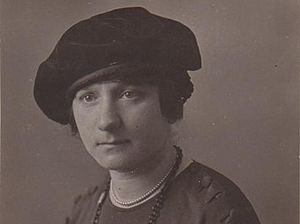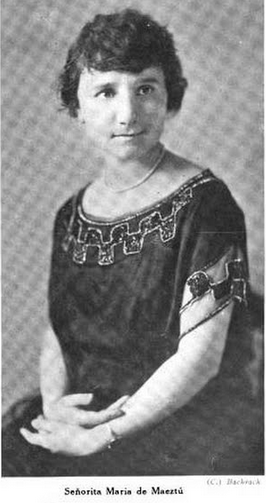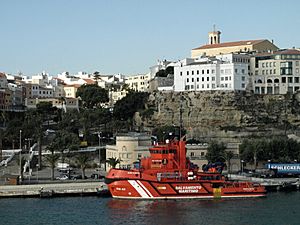Maria de Maeztu facts for kids
María de Maeztu Whitney (born July 18, 1882, in Vitoria, Spain – died January 7, 1948, in Mar del Plata, Argentina) was an important Spanish educator and a pioneer for women's rights. She founded the Residencia de Señoritas and the Lyceum Club in Madrid. She was the sister of the writer Ramiro de Maeztu and the painter Gustavo de Maeztu.
Contents
María de Maeztu's Early Life and Education
María was born in Vitoria, a city in the Basque region of Spain. Her father, Manuel de Maeztu Rodriguez, was an engineer from Cuba. Her mother, Joan Whitney, was the daughter of a British diplomat.
When María was young, her father passed away. This left her family in a difficult situation. Her mother, a strong and determined woman, moved the family to Bilbao. In 1891, she opened a school for girls. They learned French, English, and other cultural subjects.
María began teaching at her mother's school. Later, she taught in public schools in Bilbao. In 1903, she became the director of a new night school for adults. She also directed a kindergarten from 1902 to 1912. María believed in education for everyone, which sometimes caused disagreements with others. Her work became well-known, and she was invited to speak at important events.
María was a great speaker and knew many languages. This allowed her to represent Spain at international meetings. She also learned about women's groups in other countries. She studied Philosophy and Literature at the University of Salamanca. In 1908, she traveled to London to study education. She also gave lectures in the United States, Great Britain, Argentina, and Cuba.
Founding the Residencia de Señoritas
In 1915, María de Maeztu started the Residencia de Señoritas in Madrid. This was a special place for young women to live while they studied at university. It was similar to a residence for male students that had opened earlier.
The Residencia de Señoritas was the first official center in Spain to help women get a higher education. María was its first director. She invited many famous writers, artists, and thinkers to give talks and performances. People like Ortega y Gasset, Juan Ramón Jiménez, and Victoria Ocampo visited. The famous poet Federico García Lorca even read his new poems there. The Residencia became a lively place for learning and new ideas.
Starting the Lyceum Club
In April 1926, María de Maeztu founded the Lyceum Club. This was the first club for women in Spain. She created it with help from Carmen Baroja and Concha Méndez. They based it on similar clubs in other big cities like London and Paris.
The Lyceum Club was a place where women could meet, share ideas, and work for equality. It opened with 150 members, mostly educated professional women. These women wanted to do more than just stay at home. The club had different sections for social issues, literature, arts, music, science, and international topics.
The club organized lectures, concerts, and exhibitions. They worked to improve women's legal rights and create day-care centers for working mothers. Many important women were members, including Ernestina de Champourcín and María Teresa León. The club became very popular, growing to 450 members by 1929. Some people did not like the club's modern ideas. They thought it threatened traditional family values.
Spanish Civil War and Exile
The Spanish Civil War began in July 1936. Because of the war, the activities of the Lyceum Club and the Residencia de Señoritas stopped. In September, María left her role as director of the Residencia.
On October 29, 1936, her brother, Ramiro de Maeztu, was killed near Madrid. María was deeply saddened by this. She left Spain and moved to Buenos Aires, Argentina. There, she became a professor at the University of Buenos Aires. She returned to Spain only once, in 1947, for her brother Gustavo de Maeztu's funeral.
María de Maeztu passed away in Mar del Plata, Argentina, on January 7, 1948. Her body was later brought back to Spain.
During the Civil War, the Residencia de Señoritas building was used as a hospital and orphanage. In 1940, it reopened under a new name, the Colegio Mayor Teresa de Cepeda.
María de Maeztu is honored in many ways across Spain. Many streets in different cities are named after her. In 2006, Spain's Ministry of Development named a class of seven tugboats after her. These boats, known as the Clase María de Maeztu, help other ships, fight fires at sea, and clean up pollution.
Images for kids
See also
 In Spanish: María de Maeztu para niños
In Spanish: María de Maeztu para niños
 | Leon Lynch |
 | Milton P. Webster |
 | Ferdinand Smith |







